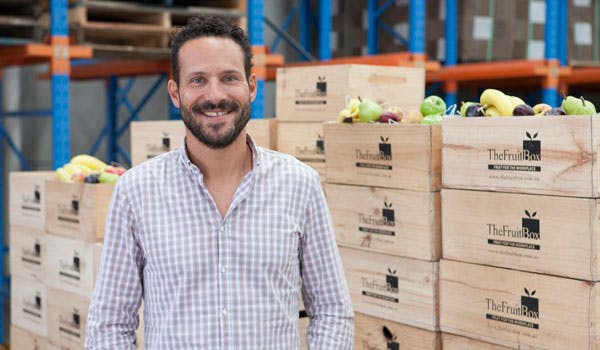Martin Halphen didn’t get to where he is overnight.
Now servicing over 8,000 corporate customers, and doing some 23,000 deliveries a week, Martin has steadily persevered and grown his Fruit Box delivery business nationwide.
Dynamic Business caught up with Martin to hear his business journey.
How did you get the idea for Fruit Box?
The business started when I bought a small fruit home delivery business in 2000 for the bayside suburbs of Melbourne.
In 2001 one of my customers asked me if we did workplace fruit, and I immediately thought ‘jeez that would be a good idea.’ I quickly advertised to Melbourne companies, and got a lot of traction very quickly, and over the next three years we gained a lot of momentum.
How has the business expanded since those early days?
Where we really had exponential growth was once I decided to take the business nationally, and set up operations in each of the major cities of Australia. We started having dialogue with national procurement managers, and landing some very big accounts on a national basis, rather than appealing just locally, or stateside.
The big decision that we made was to take the business outside our home state, and provide a national solution.
How is your business structured around the country?
We have five warehouses in five major cities, and then we service Canberra through our Sydney office, and the Gold Coast through our Brisbane office. We do the major regional centres out of our city warehouses.
We’ve got a national buying team, and typically most of the fruit is bought from the local wholesalers market in that state. For example, the Flemington markets in Sydney, the Footscray markets in Melbourne, etc. I’d say that in 90% of cases, the fruit is sourced locally.
How have you got the word out, and market your business?
We did a lot of direct marketing in the early days, and then over time things have got a lot more savvy with our online marketing campaigns. Initially we sent information via the mail to the right decision makers, and it was very targeted, direct marketing – not just a case of sending junk mail to everyone and anyone.
What are some of the main challenges you’ve faced along the way?
It’s very hard starting a business. It really took us seven years to be cash flow positive, and there’s a lot of grind and in setting up a national business. There’s a fair bit you need to invest in terms of working capital along the way.
Probably the major challenge was dealing without a proper wage for at least seven years. I came from a corporate background, and it was a very long process to build up an infrastructure, and become cash flow positive.
That was probably the biggest hurdle, hanging in there until we finally started making money out of the business.
Did you ever think ‘this is just too hard – it would be so much easier to just go back and be a salaried employee somewhere’?
Absolutely. I mean, it’s one thing coming up with an idea, but the thing that people underestimate about businesses, is the amount of time it takes to actually start making money.
There are many great ideas out there, but the investment in both time and money is enormous. Even after two or three years in, you just get tired and it does grind you down. It becomes a matter of survival of the fittest.
What made you persevere?
I had extremely good council, and my Dad was a great sounding board and always supported me. He also came from a business background and always said to me to have patience, and that it does take between five and seven years. Having that comforting energy in my life made a big difference.
Is there anything you would go back and change if you had the chance?
I think there’s a fine line when it comes to looking at mistakes. You’re never going to have all the answers from day one, and I think to truly grow a business you’ve got to be open minded and inform yourself about what does work and doesn’t work. So when it comes to a successful business, mistakes are just part of the process. The main thing is learning, and of course never making the same mistakes twice. But I do think that taking calculated risks, and making mistakes along the way, is a critical part of building a business.
What are your current plans for Fruit Box, and where do you see the future of the business?
Well to look at the timeline of what we’ve done; in 2001 we started Fruit Box, we took it nationally in 2005, in 2009 we introduced the Milk Box, and last year we introduced our gifting business – which is the Hamper Box.
So we’re comfortably growing organically by about 15-20 per year. We’re growing very quickly, and we see ourselves in the niche market of fresh tearoom supplies, so our growth plans are that we see ourselves as becoming a one-stop show for perishable tearoom supplies for corporates.
What tips or advice can you give to other entrepreneurs with a good idea?
Going back to the grind of owning and running a business, it’s not just having an idea, it takes a long time to build a business and to start actually making money from it. I think patience is extremely important, and I’ve always said you need to be restless with your ideas, but patient with your execution. It does take time before you start reaping the rewards of running a business.
The other thing I would say is to always be open-minded. There are many things that come your way, and a lot of them are things you probably won’t follow up, but it’s important to at least inform yourself about when to go ahead with something. Because if you close your mind, you miss great opportunities.

